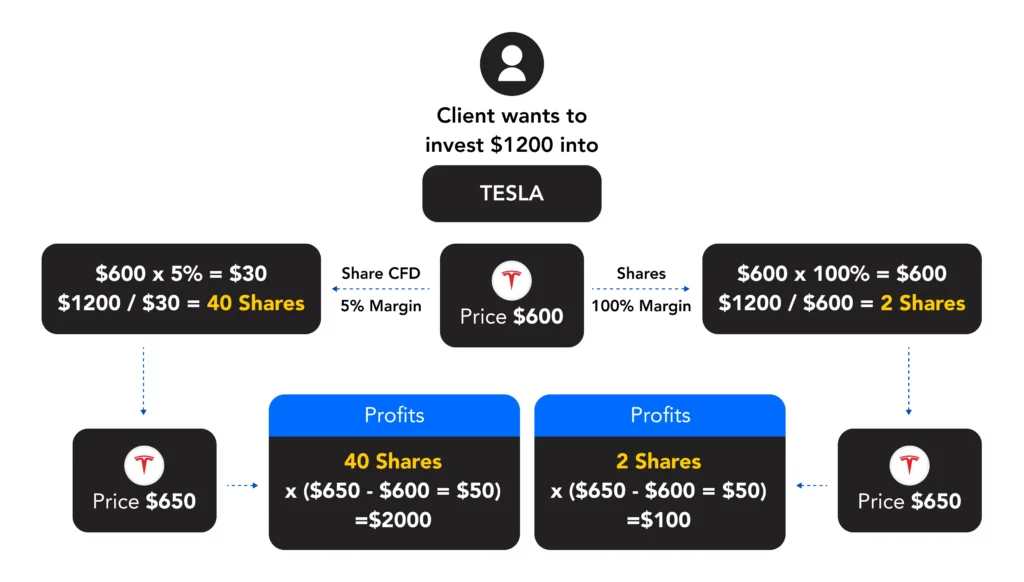-
- Trading Platforms
- PU Prime App
- MetaTrader 5
- MetaTrader 4
- PU Copy Trading
- Web Trader
- PU Social
-
- Trading Conditions
- Account Types
- Spreads, Costs & Swaps
- Deposits & Withdrawals
- Fee & Charges
- Trading Hours

While both shares trading and trading CFDs allow you to profit from changes in stock prices, CFDs, which is the abbreviation for Contract For Differences, have several advantages over conventional shares trading.
The financial instrument known as a CFD, or “contract for difference,” enables traders to speculate on the price changes of various assets without actually holding the underlying commodity. As a result, traders are able to purchase or sell CFDs on a variety of assets, including stocks, indices, commodities, and currencies, and eventually make a profit or loss based on the difference between the prices at which they open and close their positions.
To know more about CFDs, please click here to read more.
Alternatively, shares signify ownership in a business. You become a shareholder of a corporation when you purchase shares, and you are then eligible to receive a share of its assets and profits. Additionally, shareholders have the right to vote at shareholder meetings, as well as receive dividends should a company wish to pay them.
To know more about Shares and trading them, please click here to find out more.

One of the main differences between CFDs and shares is that CFDs are traded on margin, which means that traders only need to put up a small percentage of the full value of the trade. This allows traders to potentially make larger profits, but it also means that they can also incur larger losses. Shares, on the other hand, must be purchased in full in most cases, and traders cannot use leverage to increase their potential profits or losses.
Another difference is that CFDs are typically traded over-the-counter (OTC), which means that they are not listed on an exchange and are not regulated in the same way as shares. This can make CFDs more risky for traders, as there is no central authority overseeing the market. Shares, on the other hand, are typically listed on exchanges and are subject to regulatory oversight, which can provide some protection for investors. To understand further on the difference between a share trade and a CFD trade, below is an illustration of using traditional share trading and share CFD trading on Tesla stock.

In summary, CFDs and shares are two different financial instruments that allow traders and investors to speculate on the price movements of various assets. CFDs are traded on margin and are typically traded OTC, while shares represent ownership in a company and are traded on exchanges. Both have their own unique risks and benefits, and traders and investors should carefully consider which is the right choice for them based on their investment objectives and risk tolerance.
Step into the world of trading with confidence today. Open a free PU Prime live CFD trading account now to experience real-time market action, or refine your strategies risk-free with our demo account.
This content is for educational and informational purposes only and should not be considered investment advice, a personal recommendation, or an offer to buy or sell any financial instruments.
This material has been prepared without considering any individual investment objectives, financial situations. Any references to past performance of a financial instrument, index, or investment product are not indicative of future results.
PU Prime makes no representation as to the accuracy or completeness of this content and accepts no liability for any loss or damage arising from reliance on the information provided. Trading involves risk, and you should carefully consider your investment objectives and risk tolerance before making any trading decisions. Never invest more than you can afford to lose.

Trade forex, indices, metal, and more at industry-low spreads and lightning-fast execution.
Sign up for a PU Prime Live Account with our hassle-free process.
Effortlessly fund your account with a wide range of channels and accepted currencies.
Access hundreds of instruments under market-leading trading conditions.
Please note the Website is intended for individuals residing in jurisdictions where accessing the Website is permitted by law.
Please note that PU Prime and its affiliated entities are neither established nor operating in your home jurisdiction.
By clicking the "Acknowledge" button, you confirm that you are entering this website solely based on your initiative and not as a result of any specific marketing outreach. You wish to obtain information from this website which is provided on reverse solicitation in accordance with the laws of your home jurisdiction.
Thank You for Your Acknowledgement!
Ten en cuenta que el sitio web está destinado a personas que residen en jurisdicciones donde el acceso al sitio web está permitido por la ley.
Ten en cuenta que PU Prime y sus entidades afiliadas no están establecidas ni operan en tu jurisdicción de origen.
Al hacer clic en el botón "Aceptar", confirmas que estás ingresando a este sitio web por tu propia iniciativa y no como resultado de ningún esfuerzo de marketing específico. Deseas obtener información de este sitio web que se proporciona mediante solicitud inversa de acuerdo con las leyes de tu jurisdicción de origen.
Thank You for Your Acknowledgement!